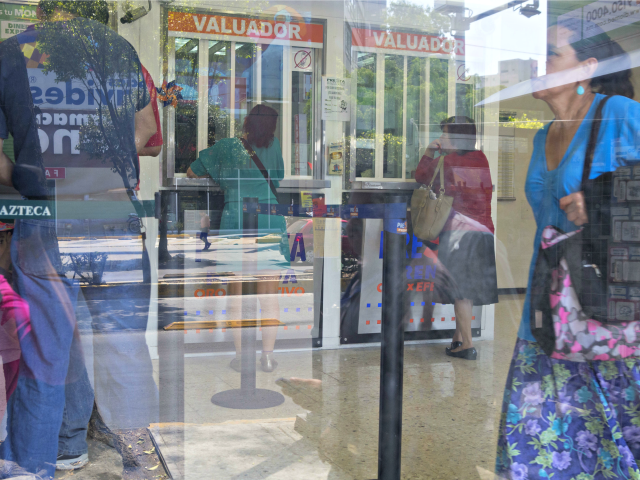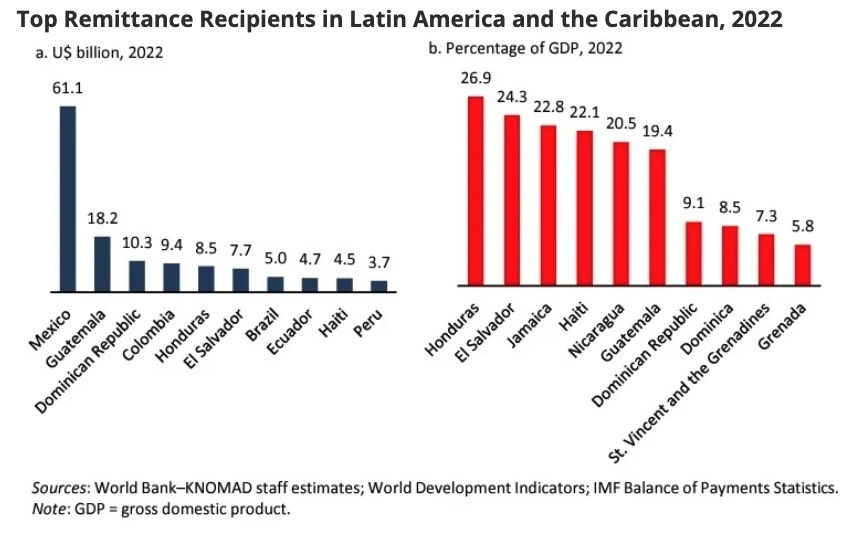President Joe’s Biden policy of welcoming poor economic migrants into Americans’ workplaces and neighborhoods is also funding anti-democratic dictatorships in countries throughout Central and South America.
The funding process is demonstrated in Nicaragua, where dictator Daniel Ortega gains taxes and political stability because Biden’s deputies invited more than 330,000 young Nicaraguan migrants into the U.S. labor market. The Nicaraguan migrants then sent $829 million in taxable remittances back to poor relatives during January, February, and March 2023. That remittance income jumped 90 percent compared to the prior year, according to QCostaRica.com
The Wall Street Journal reported on August 6:
Remittances have become so vital to the tax revenue of President Daniel Ortega’s regime that some economists say reducing the flow of the funds would be a form of political resistance. “If you didn’t have remittances, the national economy would collapse,” said Enrique Sáenz, an exiled Nicaraguan economist. “And in macroeconomic terms, Ortega would be in deep trouble.”
…
In Nicaragua, remittances more than doubled from 2018 to 2022 after President Ortega violently put down protests. This year, they are expected to account for about 33% of the country’s GDP, one of the highest rates in Latin America, said Manuel Orozco, a Nicaraguan economist at the Inter-American Dialogue.
Biden has also allowed more than 500,000 migrants from Venezuela to flee the dictatorship that has reduced the once-prosperous country to poverty. That migration is a safety valve for the dictatorship because it minimizes the likelihood of bread riots, youth rebellions, and the return of democracy. The Wall Street Journal reported:
In Venezuela, an economy that has contracted 75% over the past decade, remittances are crucial for the people who have stayed in the country under the autocratic and bankrupt government of President Nicolás Maduro, said Angel Alvarado, a Venezuelan economist at the University of Pennsylvania. “You can ask, ‘How are people not dying of hunger in Venezuela?’” Alvarado said. “The answer is that they have at least one child living abroad, sending money for food and medicine.”
Biden has also allowed roughly 500,000 Cubans into the U.S. economy since 2021, so reducing political pressure on the island’s dictators. In early 2023, Biden’s deputies expanded opportunities for people in the United States to send money back to Cuba.
The Wall Street Journal article was headlined “Rising Money Flows, Fueled by Record Migration, Prop Up Autocrats: Remittances to the developing world hit record $647 billion, aiding the poor but helping keep strongmen from Nicaragua to Tajikistan in power.”
Pro-migration advocates say the migrants’ remittances help the left-behind people avoid poverty and hunger.
But the remittances and dictatorships also cripple those economies by suffocating the political changes and economic investments that would allow each country to develop its own resources, such as young workers.
In turn, the crippled remittance economies create the next generation of migrant workers, renters, and consumers for use by the U.S. economy, much to the continued advantage of Wall Street, CEOs, investors, and organizations — such as the cartels — that help migrants reach the United States.
Connel Fullenkamp, an economist at Duke University, told the Wall Street Journal that remittances undermine economic development as they rise above roughly 7.5 percent of the home country’s gross domestic product.
That threshold is exceeded by many countries with migrants in the United States, the World Bank reported in July 2023:
Remittances to Mexico reached $61.1 billion in 2022, representing an increase of 12.9 percent. Mexico received the highest level of remittances in the region by far and is the world’s second-largest recipient of remittances. The growth of remittances varied widely across countries in 2022, ranging from a rise of 50 percent in Nicaragua to 18 percent in Guatemala, 17.8 percent in Honduras, and 9.7 percent in Colombia. Remittances to Nicaragua surged by 50 percent during this period, driven by the country’s political situation. However, remittances constitute a much larger share of GDP for a number of countries in the Caribbean and Central America.
Breitbart News has repeatedly highlighted the damage done to the United States and to poor countries by Biden’s Hunger Games-like policy of Extraction Migration:
For example, Biden’s migration policy is welcomed by Wall Street investors because it reduces pressure to invest in developing countries, Breitbart News reported in November 2021:
Throughout the 1990s, economists expected investors in wealthy countries to move job-creating investments to the developing world and, thereby, raise billions of people out of poverty, Douglas Holtz-Eakin, president of the GOP-linked American Action Forum, said.
However, “for any number of reasons — inability to enforce contracts, political problems — the capital [in wealthy countries] really didn’t flow that way. It stayed in these [wealthy] countries,” he said during an October 26 online talk organized by far-left public publication DemocracyJournal.org.
But economics does abhor a vacuum, and so “now the [poor] labor is coming for the capital,” via international migration, according to Holtz-Eakin, a pro-migration economist who formerly worked for Sen. John McCain and for President George W. Bush when he was pushing the open-borders “any willing worker” claim.
Extraction Migration
The federal government has long operated an unpopular economic policy of Extraction Migration. This colonialism-like policy extracts vast amounts of human resources from needy countries, reduces beneficial trade, and uses the imported workers, renters, and consumers to grow Wall Street and the economy.
The migrant inflow has successfully forced down Americans’ wages and also boosted rents and housing prices. The inflow has also pushed many native-born Americans out of careers in a wide variety of business sectors and contributed to the rising death rate of poor Americans.
The lethal policy also sucks jobs and wealth from heartland states by subsidizing coastal investors with a flood of low-wage workers, high-occupancy renters, and government-aided consumers.
The population inflow also reduces the political clout of native-born Americans, because the population replacement allows elites and the establishment to divorce themselves from the needs and interests of ordinary Americans.
In many speeches, border chief Alejandro Mayorkas says he is building a mass migration system to deliver workers to wealthy employers and investors and “equity” to poor foreigners. The nation’s border laws are subordinate to elite opinion about “the values of our country” Mayorkas claims.
Migration — and especially, labor migration — is unpopular among swing voters. A 54 percent majority of Americans say Biden is allowing a southern border invasion, according to an August 2022 poll commissioned by the left-of-center National Public Radio (NPR). The 54 percent “Invasion” majority included 76 percent of Republicans, 46 percent of independents, and even 40 percent of Democrats.


COMMENTS
Please let us know if you're having issues with commenting.